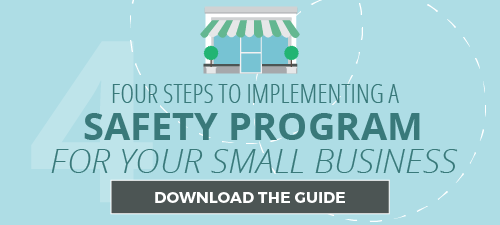It’s easy for small businesses to brush off health and safety training as unnecessary expenses if you only have a few long-term employees. You probably assume they already know how to do their jobs safely. But health and safety training isn’t always that easy, and just because you’ve been managing your business one way since the beginning, doesn’t mean that’s the right way to manage your business now. Health and safety training regulations can change annually. As your business shifts and grows, you’ll need to make adjustments to the way you protect your employees and your company. Safety matters for small businesses, and here are just a few reasons why:
Every small business workplace has some element of risk
Even if your workers aren’t in hazardous conditions like electrical wiring or scaffolding every day, that doesn’t mean they don’t encounter hazards in their workplace. Something as small as a cleaning product is considered by OSHA to be a hazardous substance that requires Hazard Communication training as well as training on safe handling. Even employees who primarily work at a computer desk can avoid risks by understanding electrical hazards, ergonomic design of their workstation, and the potential of trips and falls from tangled cords and wires or a file drawer left open.
WC Claims can shut down a small business
Another important reason every small business should implement health and safety training is to protect themselves from expensive workers’ compensation claims. Health and safety training is in place to keep your employees safe. As your most valuable asset, the strength and health of your team is vital. On top of that, a hefty workers’ compensation claim can shut down a small business. To protect your company from expensive lawsuits it is important to implement the safety training your employees need to perform their jobs with minimal risk.
OSHA compliance
OSHA requires all businesses to provide employees with a safe workplace. This means educating employees about the hazards that exist, regardless of your company’s size. This may be as simple as labeling cleaning products and alerting employees to their dangers, or creating a safety manual detailing policies and procedures for your small business. It’s important to remember that the more time you put into creating safety procedures now, the better protected you and your employees will be in the future. Being proactive about your workplace safety will also show OSHA that you’re not only motivated but committed to fostering a safe work environment.
Save Money
It’s well documented that proactive safety training saves companies money in the long run. While it may seem unnecessary to spend time and money developing a training program when no one’s been injured, it’s important to remember your training program is about the wellbeing of your employees and planning for today, as well as tomorrow. This saves you money in paid time off, hospital bills, and even increased insurance costs. Another important but often overlooked value is that of the morale and productivity of your employees.
Boost productivity
Studies have shown that employees who feel they’re appreciated and taken care of are more productive. Safety training helps keep your employees safe, but it also shows that you care about them and their wellbeing. Employees who can go about their jobs in a manner that’s safe are likely to get more done in a shorter amount of time.
Health and safety training really does matter for small businesses. All employees are important, but the smaller your business, the bigger the impact on the team when a team member is absent. Though workers’ compensation claims may seem like the most detrimental outcome of an incident, the loss of stability, confidence, and morale can be just as (if not more) destructive to your business. Safety training does not have to be a scary and expensive thing. When implemented correctly, training saves small businesses money, creates more productive employees, and helps ensure you’re in compliance with OSHA regulations.
We know safety training can be confusing for small businesses. If you’re new to owning a business, know that OSHA provides a wealth of information for small businesses specifically, regarding what training courses you need to provide, and which courses are not relevant to you. Check out their small business resources for more information.
Once you know what training courses are right for your small business, be sure to check out eSafety. We make safety training for small businesses easy, with an intuitive learning management system. We offer OSHA compliant courses, and the ability to upload custom content to effectively train and report on your company training. Request a free, no-obligation quote online today!


